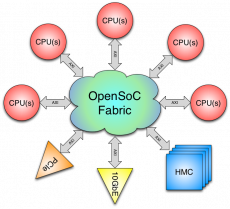OpenSoC Fabric
Abstract
Recent advancements in technology scaling have shown a trend towards greater integration with large-scale chips containing thousands of processors connected to memories and other I/O devices using non-trivial network topologies. Software simulation proves insufficient to study the tradeoffs in such complex systems due to slow execution time, whereas hardware RTL development is too time-consuming. We present OpenSoC Fabric, an on-chip network generation infrastructure which aims to provide a parameterizable and powerful on-chip network generator for evaluating future high performance computing architectures based on SoC technology. OpenSoC Fabric leverages a new hardware DSL, Chisel, which contains powerful abstractions provided by its base language, Scala, and generates both software (C++) and hardware (Verilog) models from a single code base. The OpenSoC Fabric infrastructure is modeled after existing state-of-the-art simulators, offers large and powerful collections of configuration options, and follows object-oriented design and functional programming to make functionality extension as easy as possible.
Website
Download
Project Participants
About Berkeley Lab
Founded in 1931 on the belief that the biggest scientific challenges are best addressed by teams, Lawrence Berkeley National Laboratory and its scientists have been recognized with 16 Nobel Prizes. Today, Berkeley Lab researchers develop sustainable energy and environmental solutions, create useful new materials, advance the frontiers of computing, and probe the mysteries of life, matter, and the universe. Scientists from around the world rely on the Lab’s facilities for their own discovery science. Berkeley Lab is a multiprogram national laboratory, managed by the University of California for the U.S. Department of Energy’s Office of Science.
DOE’s Office of Science is the single largest supporter of basic research in the physical sciences in the United States, and is working to address some of the most pressing challenges of our time. For more information, please visit energy.gov/science.










